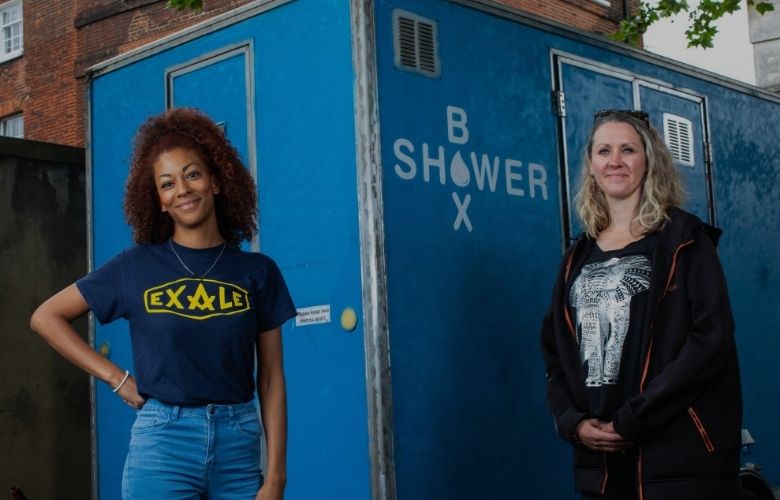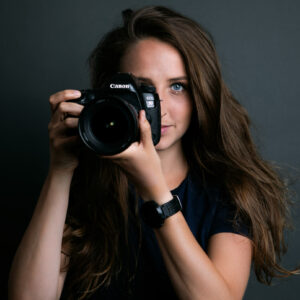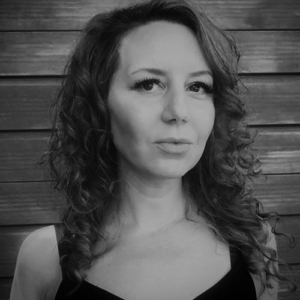
Theatre photographer Ali Wright has released a new series My Latest Role which is a collection of environmental portraits of theatre key workers on the Covid-19 frontline to tell their stories. Ali shares with TheatreArtLife how the project came to be, and how those in the UK theatre industry have adapted and helped others in this time.
Since Covid-19 and the closure of theatres, more than 70% of self employed workers in the creative industries are worried they will not be able to pay their bills (BECTU Union), including close to 50% not eligible for any government support (The Stage).
As a sector built on creativity, we have been known to innovatively turn every threat into an opportunity and the current pandemic is no exception. Theatre professionals are adapting, repurposing their skill set, as a way to survive financially, remain resilient to the evolving world, to exist meaningfully for the community and play an active role in the fight against Coronavirus.
When Covid-19 caused the theatre industry to shut down, myself and thousands of other freelancers lost their livelihoods. Personally, I found this shift very difficult, I also only received a tiny fraction of my wage from the government schemes.
I was curious how other people in the theatre industry were coping; I spoke to my friend/colleague Dev, about how the pandemic had been for them. They are a theatre designer and prop-maker. They had taken a job in a factory assembling and testing ventilators. I thought their adaptation and resilience and desire to play an active role in the fight against coronavirus was extraordinary.
I decided that I wanted to amplify stories like Dev’s, so I sought out more theatre professionals turned key workers/volunteers – and the series has grown from there.
Paris: When lockdown began I was in between jobs. I worked on a Disney film at the beginning of the year and was waiting for the high season of the entertainment industry to kick in whilst I was also due to be working on another film.
I have received no financial support from any scheme at all but by chance I was asked to work at one of the temporary morgues in East London. That job ended and I felt that since I was already working with the dead I could get a job as an undertaker. I applied for a few positions and the rest is history.
As a funeral service operator my job consists of transporting cadavers/coffins, funeral admin and pallbearing at funerals. I find the job highly satisfying and enjoy the role. I think that my background as an artist helps me in some subtle ways. For example when needing to be articulate and considerate whilst interacting with bereaved families.
The coronavirus restrictions means less people are allowed to attend the funeral and less pallbearers carrying the coffin. However, during the peak of the pandemic we were attending five funerals a day, five days a week. Boys in their teens were recruited in order to help with the demand. Fortunately the pace has slowed down and we are back at normal levels now.
Having seen death up close and on a constant basis has oddly resulted in me having less fear in general. I am not quite sure what the cause of this is. However, it has made me change my perspective and a lot of things that used to make me anxious don’t register with me any longer.
Reece: When lockdown kicked in I had just left a full-time job to develop my portfolio freelance practice. My intention had been to spend most of March networking and developing relationships ready to start working on projects. I had some savings left over from my full-time role and a bit of cash to see me through for the next couple of months, but beyond that I knew I would have to find work which would sustain me as I wasn’t eligible for either the furlough or self-employed schemes. I was fairly certain I would have to pack up and leave London to move back in with my Mum in York.
I met the Museum of Homelessness (MOH) team through my last project. MOH’s immediate response when Covid-19 hit was to change their business model so they were able to operate as an emergency relief organisation – finding a building, volunteers and partnering with Streets Kitchen to develop the infrastructure to provide 7 days a week support to members of the homeless community in Islington. MOH were key in lobbying the government to provide Temporary Accommodation (TA) for rough sleepers during the height of the crisis.
My role is ‘Homeless Taskforce Hub Supervisor’, meaning I’m responsible for managing a small team of volunteers. We support roughly 50-60 people each day in the Angel/Highbury & Islington area – some of which are in TA and others who are street homeless. As a supervisor, I’m responsible for ensuring everyone has the correct PPE, that hand washing stations are set up and checking everyone’s temperature on arrival. We then get to work preparing food packs for the TAs which includes snacks, cooking ingredients and toiletries. We provide everyone with a hot meal each day, which is either cooked on site or provided via a mutual aid group.
I’ve loved working with the hub once a week. I’m so thankful to have had a purpose. The biggest shift for me was adjusting what I knew about pastoral care and putting that into a non-theatrical social justice context which I’d had little experience of working in. It’s an area of work which you get emotionally involved in very quickly – I find myself getting quickly worried if we don’t see a rough sleeper we’ve been supporting for a few days. You take that home with you.
I applied for the ACE emergency grant to cover the confirmed income lost – thankfully I was successful. The ACE money was a relief and gave me some breathing space to find more work. I’ve managed to fill the other 4 days in the week with freelance comms, admin and producing work – I think it’s been easier for producers to pick up work during this time than other creatives because our skill set is quite broad and we already wear many different hats.
Dev: When lockdown began I was working on a few different projects. I was a stage manager at The Murdér Express (created by Funicular Productions) – an immersive dining experience. As news of the pandemic hit we lost more and more pre-booked audience members until the show was put on hold around a week or so before lockdown started. I lost a large source of income immediately with all future shows cancelled. Additionally in the first few weeks of lockdown two other large projects were put on hold (one eventually cancelled completely) – I was to work as an assistant stage manager on one and as a costume designer and wardrobe supervisor on the other. There was a lot of personal stress and anxiety both with jobs being cancelled and with waiting in an indefinite limbo to get work to start up again. I have depression and found it really difficult to deal with the impact of Covid-19 on the theatre industry.
I needed to continue working and searched for key worker roles so I could do something helpful at the same time. I spend between 8-12 hours doing final assembly and testing on ventilators. It’s a lot of concentration on a repetitive task. Shifts range from starting at 6:30am to 10.30pm. I am one in a line of workers – we all complete separate tasks to finish the ventilators. I’m doing small fiddly tasks and in this regard it is similar to prop making, but otherwise testing and building machinery like this is completely new to me.
It is satisfying to know that I am building machines that will save people’s lives. However the work is repetitive and can be very arduous. On a day to day basis it can be really draining. Additionally shift work is something I’m not used to – neither is waking up at 4am – so that can be pretty challenging. I’m working nearly 6 days a week every week and I’m tired all the time.
Parvinder: When lockdown began I was working on various projects for film and theatre including working on my play, Her, to approach bigger London theatres. I will need to now hold off until next year. I haven’t had a chance to really take in what that meant for me as a creative as I am working as a doctor in this time, and the impact of being a doctor on the frontline has been so huge.
I am a doctor of mental health and have been working in the NHS since 2012. My days are very varied. Sometimes I cover admissions in A+E, sometimes work on the ward, sometimes patients are brought in by the police for assessment. Mostly I work on the children and adolescents clinic. I help run the list of cases and I will be the doctor on call if needed. I often use my theatre and film skill set in my key role. I have even led a drama and writing group with some of my patients which has been an excellent tool for them to express themselves away from formal therapy sessions.
Covid-19 has had an enormous impact. I have had to move house in order to get to work more quickly and I have had to sacrifice annual leave. We didn’t have PPE for a number of weeks which was really hard as it put staff in a difficult position having to work without lifesaving equipment. We have changed the service in this time, trying to minimise the number of people in the building. We’ve had a new rota with most staff working from home if possible and doing their consultations over the phone. That was hard; as a doctor I get most of my information from physical examinations and face to face consultations.
I think this time of Covid has revealed a harsh truth: when it comes to a crisis we are on our own in the NHS. I have been disappointed with the government in how they have responded to this pandemic. I wrote a poem called Object about the NHS Heroes, in which I asked; ‘you wouldn’t send a soldier into war without a gun, so why let your doctors go to work without a mask?’. The reality is that the government does not care for staff in the NHS, that my life is not deemed important. It saddens me that I have worked my entire life to become a doctor and this is how I and my friends have been treated. My friend wrote a will in case he died. He is 32.
I have to say I am so grateful for my creative friends, they have kept my morale high, my spirits excited, and I love that in the face of this tough time, we have found ways to keep growing and developing.
Sarah: The initial stage of lockdown was disorientating and massively worrying. The virus itself was panic-inducing and then it had a major impact on my finances as my income stopped overnight. Production companies suspended their work, which meant my presenting and acting jobs stopped, and venues and schools closed bringing my DJing and workshop presenting to an abrupt halt as well. I received no Government or Arts Council help.
I founded ShowerBox in 2018, having been a volunteer for various homeless organisations in London for years. Through conversations I had with individuals living on the streets, it struck me how daily life would be a little less challenging with access to free showers (and of course, more free toilets, more drinking fountains etc), which are offered in other parts of the world. I explored this in an article for HuffPost and started a petition to try to get politicians on board. Dissatisfied with the response, I decided to do what I could to help. I fundraised for a shower trailer, which has since serviced shelters and homeless services across London. We also received a grant from Somers Town Community Association last year.
My years of freelance work have been solid training for ShowerBox! I have to be extremely organised, open, creative and energetic to run the project, as there are quite a few different strands to it. I’m often juggling, and I know this feeling well from my freelance work! Despite this the role is enriching. ShowerBox was a concept in a conversation and now it actually is out on the streets.
I do have to work to ensure the responsibility doesn’t overwhelm me. I receive messages from different parts of the country, requesting help in their city too. I have to detach at times, create a simple plan and follow the steps methodically. Recently the trailer had to be repaired and so it was out of action for two weeks. It was a reminder that there will often be parts of the project and occurrences which are out of my control. At those times I try to breathe out the stress, revise the plan, and start again.
Claire: I was the Artistic Director of a large venue in Catford as lockdown began. I experienced a lot of anxiety at first, finding it really difficult trying to adjust to a sense of nothingness after working flat-out for the last 20 years and I felt guilty for the other artists I had employed and involved on my current project.
Sarah (Lamptey, ShowerBox Founder) is a friend and I was aware of ShowerBox but never had the time to properly get involved. It’s an amazing project that makes a massive difference, to feel clean, to have your sense of self-worth renewed and to not be wearing the dirt of London’s streets!
On a normal day, I arrive on the site, prepare a table of the “giveaway” items, prepare the showers, guide any new volunteers, and welcome anyone wanting to use the showers. We gently ask if there is anything they need and we let them know where they are in the queue. I keep an eye on how long each person is in the shower and clean it thoroughly after each use.
I worked for many years with marginalised groups and I am trained in facilitation skills. I think these skills play a big part in terms of adapting to different personalities, treading gently with those who are suffering with mental health issues and feeling vulnerable. Regardless, the role is incredibly satisfying. At a time when I have felt utterly directionless, confused and without any purpose, the structure and routine of being involved in the project has helped give my week a ‘shape’ amongst endless repetitive days. Having to be bright and positive around those who literally have nothing has helped me to take stock of how fortunate I am. I have felt useful and inspired by those I have met: I have been humbled by their resilience.
Fortunately I have started taking images at a few outdoor concerts including some opera performances. However, My Latest Role has been an extraordinary experience and I intend to continue making work that gives an insight into different people’s experiences and shares unusual stories, particularly in our current radically changed world. I am therefore currently planning my next portrait series.
If you are in a position to do so, please consider making a donation to The Theatrical Guild to support theatre workers facing financial hardship.
Ali’s full portrait series can be found at www.mylatestrole.com
Ali’s website: www.aliwrightphotography.com
Insta: @aliwright_photographs
Twitter: @aliwrightphoto

The Human Library: Check Out Real People
Alice Smart: Interview with a London based Costume Constructor


Michelle is a musician and composer from the UK. She has performed across the UK and Europe and is passionate about arts education and opportunities for women and girls.
Read Full Profile© 2021 TheatreArtLife. All rights reserved.

Thank you so much for reading, but you have now reached your free article limit for this month.
Our contributors are currently writing more articles for you to enjoy.
To keep reading, all you have to do is become a subscriber and then you can read unlimited articles anytime.
Your investment will help us continue to ignite connections across the globe in live entertainment and build this community for industry professionals.